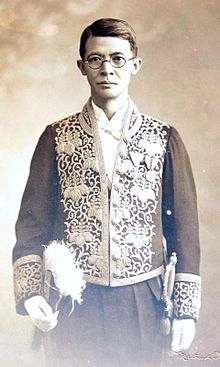Tu Tsung-ming
Tu Tsung-ming | |
|---|---|
| 杜聰明 | |
 | |
| Born | August 25, 1893 Chi-lân-sam-pó, Tamsui County, Taipeh Prefecture, Taiwan, Chinese Empire (now Tamsui, New Taipei, Taiwan) |
| Died | February 25, 1986 (aged 92) |
| Alma mater | Kyoto Imperial University Taihoku Imperial University |
| Occupation(s) | Pharmacologist, educator |
| Spouse | Tu Lin Shuangsiu 杜林雙隨 |
Tu Tsung-ming (Chinese: 杜聰明; pinyin: Du Congming, Japanese: Tō Sōmē), was the first Doctor of Medical Sciences (equivalent to Ph.D.) of Taiwan.
Biography[edit]
Early life and education[edit]
Tu Tsung-ming was born in Tamsui in 1893. He entered the Medical school under Government-General of Taiwan[1] in 1909. Since his physical test score on the entrance exam did not meet the standard, he would not be able to enter this school. However, his test results were top, so the president of the school, Junzo Nagano(長野純蔵), decided entrance as a special case. He was always at the top of his class, and became healthy step by step through swimming, mountaineering and excises. The movement that requested to overthrow China's Qing dynasty was rising in 1910, and he joined the under society Tongmenghui with his friends[2]. In 1914, he graduated the Medical school at the head of his year (13th).
After graduation, he entered Kyoto Imperial University under the support of Tugio Horiuchi (堀内次雄), the president of the Medical school in 1922. He majored internal medicine and pharmacology there. He became a member of Kuomintang in 1916.
Working in Taiwan as a doctor[edit]
In 1921, he came back to Taiwan and started working as a lecturer in the Medical school under Government-General of Taiwan. He submitted his doctoral dissertation to Kyoto Imperial University in 1922[3], and became a Doctor of Medical Sciences (equivalent to a Ph.D.). He was promoted to professor at the Medical school in the same year, and he was the first Taiwanese professor in Japan's pre-1945 imperial university system, at Taihoku Imperial University (now National Taiwan University). His pharmacology research lab was the cradle of medical research in Taiwan. The laboratory did pioneering research on methods to treat opium addiction, on the toxicology of snake venom, and on the pharmacology of traditional Chinese medicine.
In addition to participating in pharmacological and toxicological research, Tu also contributed to medical education. After the World War II, he was the first dean of the National Taiwan University Medical College. In 1954, Tu founded Kaohsiung Medical College (now Kaohsiung Medical University) and became the first president of the College (1954–1966).
Relatives[edit]
- Wife: Tu Lin Shuangsiu(杜林雙隨)
- Third son: Anthony TU(杜祖健) is a chemist. He is a specialist of toxicology, biological agent and chemical weapon. When the Matsumoto sarin attack had occurred in 1994, he advised for resolution.
External links[edit]
References[edit]
- ^ This school became the College of Medicine, National Taiwan University after 1928.
- ^ Chiang Wei-shui also joined when he was a student.
- ^ The title of his dissertation was "The way of research of Traditional Chinese medical care"(漢方医学に関する研究方法の考察).
- 1893 births
- 1986 deaths
- Hokkien scientists
- Hokkien people
- Scientists from New Taipei
- Presidents of National Taiwan University
- Academic staff of Kaohsiung Medical University
- Kyoto University alumni
- Taiwanese toxicologists
- Taiwanese pharmacologists
- Academic staff of the National Taiwan University
- Taiwanese people of Hoklo descent
- Taiwanese people stubs
- Asian scientist stubs
